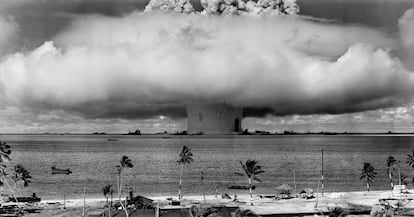Let’s talk about nuclear weapons
The decades during which these arms have not been used in armed conflicts represent a significant achievement for humanity

On the fateful morning of August 6, 1945, the United States dropped a bomb that obliterated the Japanese city of Hiroshima. Three days later, Nagasaki suffered the same fate. The Japanese Empire realized that without surrender, its territory would be devastated. Thus, 24 days after the bombing of Nagasaki, the Emperor signed the unconditional surrender of Japan.
At that time, the United States was the sole power that had nuclear weapons. It was widely assumed, however, that this monopoly would not last. Inevitably, other nations would develop the necessary technology to produce and deploy nuclear weapons. Experts thought nuclear proliferation was unstoppable. They believed that once numerous countries possessed these weapons, eventually one would use them. To date, this has not happened.
Eight decades after Hiroshima and Nagasaki, only nine countries currently have nuclear weapons. Perhaps this is the most underappreciated achievement of the past 80 years, and it is a triumph of an entity often scorned and fiercely criticized: the “international community.”
There’s never been any such thing. What we have had, and continue to have, is a formal agreement through which the world’s major powers commit to diligently limit the spread of nuclear technology and to limit their arsenals. This was largely achieved thanks to “the international community,” that is, a group of countries agreeing to work together to achieve goals they could not accomplish acting alone.
Containing proliferation was not easy. Shortly after 1945, the Soviet Union (now Russia), the United Kingdom, France and China became nuclear powers. A more recent group included India, Pakistan and North Korea. Although Israel has not formally acknowledged its status, it is generally assumed that it had a significant number of nuclear weapons.
The “non-proliferation regime” was crucial in stabilizing the world’s strategic balance. It was organized around the Nuclear Non-Proliferation Treaty (NPT) signed on July 1, 1968, which required all signatories to take steps to prevent the spread of nuclear weapons to new countries.
As a result, many nations that had spent vast sums on official programs to develop their own nuclear weapons abandoned these efforts: Brazil, Argentina, Libya and apartheid South Africa are among the most notable cases. They chose to join the NPT and give up their nuclear programs. Moreover, neutral countries in Europe, such as Switzerland and Sweden, actively explored the possibility of developing their own nuclear weapons in the 1950s and 1960s but did not do so, partly due to pressure from the new Non-Proliferation regime.
Unfortunately, despite its successes, the Non-Proliferation regime is weaker today than ever before. The fragmentation of the international arena has increased, making international cooperation increasingly challenging. The Islamic Republic of Iran longs to have a weapon that would perpetuate the theocratic dictatorship in power and provide parity with Israel.
Iran is surrounded by neighbors it can’t get along with, including the very wealthy but ill-governed Saudi Arabia. For the House of Saud, the idea of living just kilometers away from a Shiite theocracy with nuclear weapons is simply intolerable: the pressure for Saudi Arabia to also acquire a nuclear weapon could become overwhelming. Furthermore, if Iran and Saudi Arabia got hold of nuclear weapons, Turkey would also feel pressured to get nuclear weapons. With four nuclear powers all in close proximity and at odds with each other, the risks of sliding into an unimaginable tragedy are enormous.
Proliferation risk has taken on new characteristics and new players. Experts contend that the risk is not only that a government with nuclear weapons might use them. There is also a growing threat that malicious actors, acting on their own, might obtain a nuclear weapon. Terrorists, militias, drug traffickers, arms dealers and rebels of all kinds would have very good reasons to procure such weapons. These are threats that did not exist when states were the sole actors.
The decades during which nuclear weapons have not been used in armed conflicts represent a significant achievement for humanity. No excuse will ever be acceptable on the day these devastating weapons are used once more. Nuclear proliferation continues to pose one of the greatest threats to humanity. It is imperative to give it the attention it deserves.
Sign up for our weekly newsletter to get more English-language news coverage from EL PAÍS USA Edition
Tu suscripción se está usando en otro dispositivo
¿Quieres añadir otro usuario a tu suscripción?
Si continúas leyendo en este dispositivo, no se podrá leer en el otro.
FlechaTu suscripción se está usando en otro dispositivo y solo puedes acceder a EL PAÍS desde un dispositivo a la vez.
Si quieres compartir tu cuenta, cambia tu suscripción a la modalidad Premium, así podrás añadir otro usuario. Cada uno accederá con su propia cuenta de email, lo que os permitirá personalizar vuestra experiencia en EL PAÍS.
¿Tienes una suscripción de empresa? Accede aquí para contratar más cuentas.
En el caso de no saber quién está usando tu cuenta, te recomendamos cambiar tu contraseña aquí.
Si decides continuar compartiendo tu cuenta, este mensaje se mostrará en tu dispositivo y en el de la otra persona que está usando tu cuenta de forma indefinida, afectando a tu experiencia de lectura. Puedes consultar aquí los términos y condiciones de la suscripción digital.









































